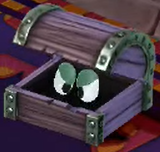Comeon: Difference between revisions
LinkTheLefty (talk | contribs) mNo edit summary |
DingoHazel (talk | contribs) mNo edit summary |
||
| Line 1: | Line 1: | ||
{{species infobox | {{species infobox | ||
|image=[[File:SMRPG NS Comeon.png| | |image=[[File:SMRPG NS Comeon.png|171px]]<br>A Comeon in ''Super Mario RPG'' (Nintendo Switch) | ||
|first_appearance=''[[Super Mario RPG: Legend of the Seven Stars]]'' ([[List of games by date#1996|1996]]) | |first_appearance=''[[Super Mario RPG: Legend of the Seven Stars]]'' ([[List of games by date#1996|1996]]) | ||
|latest_appearance=''[[Super Mario RPG (Nintendo Switch)|Super Mario RPG]]'' ([[Nintendo Switch]]) ([[List of games by date#2023|2023]]) | |latest_appearance=''[[Super Mario RPG (Nintendo Switch)|Super Mario RPG]]'' ([[Nintendo Switch]]) ([[List of games by date#2023|2023]]) | ||
Latest revision as of 01:57, July 18, 2024
| Comeon | |
|---|---|
 A Comeon in Super Mario RPG (Nintendo Switch) | |
| First appearance | Super Mario RPG: Legend of the Seven Stars (1996) |
| Latest appearance | Super Mario RPG (Nintendo Switch) (2023) |
| Variant of | Pleaseno Ameboid |
A Comeon (originally known as a Chester) is an enemy disguised as a treasure box that appears in Super Mario RPG: Legend of the Seven Stars. Inside the chest (hence the original name) is its body, which resembles a tan Ameboid. It is one of the various enemies Wizakoopa creates and can be found in one of the Trial Course's two battle courses in Bowser's Keep.
A Comeon is the most powerful member of the Huhwhat family, sporting the highest stats in all areas, although despite its attack stat being among the highest of all enemies at 220, the Comeon uses only magic, so its Ameboid body is never revealed in-game. It also shares Ameboid's immunity to all elemental attacks and status effects except Jump, which it is weak to. It follows a predictable attack pattern: Its first action in battle is to summon a Bahamutt, followed by using Sand Storm on its next turn, and then using either Mega Recover to heal or Flame Wall to damage the party. The odds of each are 2/3 in favor of Mega Recover and 1/3 in favor of Flame Wall. The Comeon's pattern then restarts. If the previous Bahamutt is defeated, however, it creates another Bahamutt. It may also use Flame Stone to inflict Fire damage to one character.
A friendly Comeon can be found in the upper room inside Monstermama's house in Monstro Town. It tells Mario how many Hidden Treasures that remain yet to be discovered; collecting them all prompts it to say, "Wow, you found them all."
Profiles and statistics[edit]
Super Mario RPG: Legend of the Seven Stars[edit]
| Super Mario RPG: Legend of the Seven Stars enemy | |||||||||
|---|---|---|---|---|---|---|---|---|---|
| Chester | |||||||||
| HP | 1200 | FP | 100 | Speed | 1 | ||||
| Location(s) | The Trial Course | Attack | 220 | Magic attack | 120 | ||||
| Role | Common | Defense | 120 | Magic defense | 80 | ||||
| Bonus Flower | None | Yoshi Cookie | None | Morph rate | 0% | ||||
| Evade | 0% | Magic evade | 0% | Spells | Flame Stone, Sand Storm, Mega Recover, Flame Wall | ||||
| Weak | Jump | Strong | Fire, Thunder, Ice, Fear, Poison, Sleep, Mute, Critical | Sp. attacks | None | ||||
| Coins | 200 | Exp. points | 150 | Items | None | ||||
| Psychopath | "I love my job!♡" | ||||||||
Super Mario RPG (Nintendo Switch)[edit]
| Super Mario RPG enemy | |||||||||
|---|---|---|---|---|---|---|---|---|---|
| Comeon | |||||||||

|
HP | 1200 | Weak Elements | Drops | N/A | ||||
| Exp. | 150 | Weak Statuses | N/A | Rare Drops | N/A | ||||
| Found in | Bowser's Keep | ||||||||
| Monster List profile | Terrified of what might be in the box? You should be—it's a Comeon! They're almost invariably watching you. | ||||||||
| Thought Peek | "You sure are a greedy one. ♡" | ||||||||
| Animations | |||||||||
Names in other languages[edit]
| Language | Name | Meaning | Notes |
|---|---|---|---|
| Japanese | ナンジャロ[?] Nanjaro |
Pun on「ナンダロウ」(Nandarō, "Huhwhat") and「なんじゃろ」(nan jaro, an expression meaning "I wonder what it is" with a sentence ending characteristic of old men's speech) | |
| Chinese (simplified) | 谜贾罗[?] Míjiǎluó |
From「谜」(mí, "enigma") and the part of Japanese name | |
| Chinese (traditional) | 謎賈羅[?] Míjiǎluó |
From「謎」(mí, "enigma") and the part of Japanese name | |
| Dutch | Dakanny[?] | From dat kan niet! (the exclamation "that's not possible!") | |
| French | Cocoffre fort[?] | From coffre-fort ("safe"); can also be understood as "Strong Pleaseno" | |
| German | Trugtruhe[?] | Deceit Chest | |
| Italian | Scrignolo boh[?] | Li'l chest huh; from scrigno ([treasure] "chest") and the diminutive suffix -olo | |
| Korean | 머임[?] Meoim |
Pun on "머지" (Meoji, "Huhwhat") and "뭐임" (mwoim, an expression meaning "what?" with a sentence ending often used on the Internet) | |
| Spanish | Fiascofre[?] | Portmanteau of "fiasco" and cofre ("chest") |